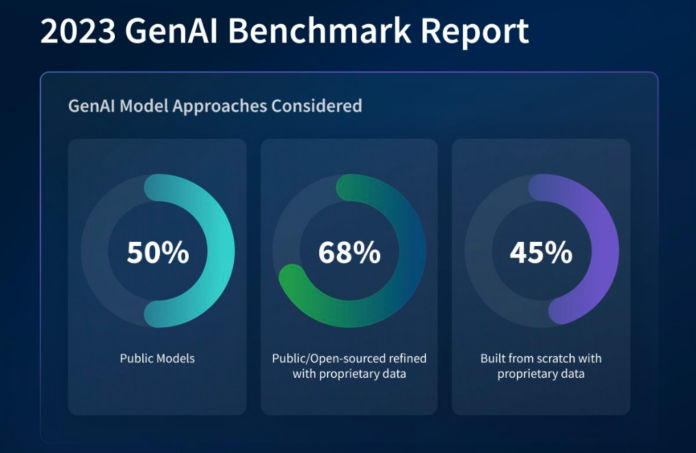Companies are planning significant investments in technologies that enhance data fabrics to enable generative AI success, and are looking to a hybrid approach that incorporates generative AI with traditional AI to scale its impact across their organisations.
These are from the Generative AI Benchmark Report, based on a survey of 200 C-level executives,VPs and directors done in August 2023 by Enterprise Technology Research (ETR) on behalf of Qlik.
“Generative AI’s potential has ignited a wave of investment and interest both in discreet generative AI tools, and in technologies that help organisations manage risk, embrace complexity and scale generative AI and traditional AI for impact,” said James Fisher, chief strategy officer at Qlik.
The report found that while the initial excitement of what generative AI can deliver remains, leaders understand they need to surround these tools with the right data strategies and technologies to fully realise their transformative potential.
And while many are forging ahead with generative AI to alleviate competitive pressures and gain efficiencies, they are also looking for guidance on where to start and how to move forward quickly while keeping an eye on risk and governance issues.
Even with the market focus on generative AI, respondents noted they clearly see traditional AI still bringing ongoing value in areas like predictive analytics.
Where they expect generative AI to help is in extending the power of AI beyond data scientists or engineers, opening up AI capabilities to a larger population. Leaders expect this approach will help them scale the ability to unlock deeper insights and find new, creative ways to solve problems much faster.
Thus, 79% of respondents have either purchased generative AI tools or invested in generative AI projects, and 31% say they plan to spend over US$10 million on generative AI initiatives in the coming year.
However, those investments run the risk of being siloed, since 44% of these organisations noted they lack a clear generative AI strategy.
When asked how they intend to approach generative AI, 68% said they plan to leverage public or open-source models refined with proprietary data, and 45% are considering building models from scratch with proprietary data.
Expertise in these areas is crucial to avoiding the widely reported data security, governance, bias and hallucination issues that can occur with generative AI.
Respondents understand they need help, with 60% stating they plan to rely partially or fully on third-party expertise to close this gap.
Many organisations are also looking to data fabrics as a core part of their strategy to mitigate these issues. Respondents acknowledged their data fabrics either need upgrades or aren’t ready when it comes to generative AI.
Only 20% believe their data fabric is very or extremely well equipped to meet their needs for generative AI. Given this, 73% expect to increase spend on technologies that support data fabrics.
Part of that spend will need to focus on managing data volumes, since almost three quarters of respondents said they expect generative AI to increase the amount of data moved or managed on current analytics.
The majority of respondents also noted that data quality, ML/AI tools, data governance, data integration and BI/Analytics all are important or very important areas to delivering a data fabric that enables generative AI success.
Investments in these areas are expected to help organisations remove some of the most common barriers to implementation per respondents, including regulation, data security and resources.
















